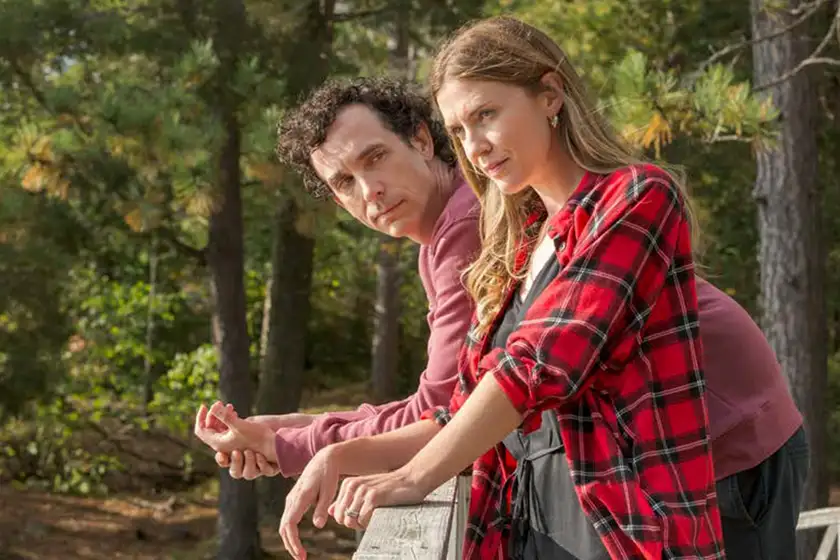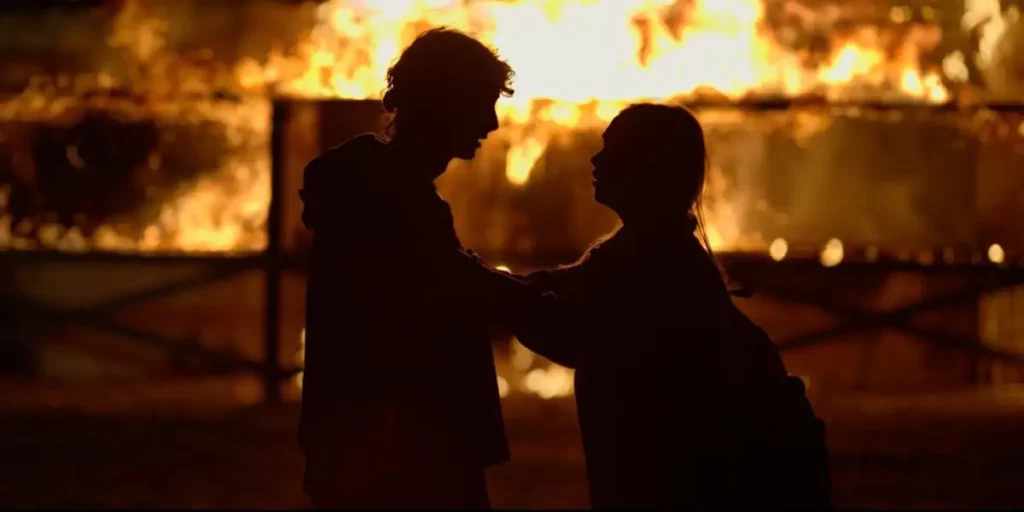Sean Garrity’s wispy romance The Burning Season removes romantic pining in favour of an elaborate, reverse chronological structure.
In The Burning Season, a romance that is spread across seven chapters, the story is presented to the audience in reverse chronological order. This isn’t a common structural practice because finding a reason to go against the norm and construct a film in reverse order is like trying to swim upstream. Stories want and often need to be told in a certain way, though films have been successful in doing this before. Such as Christopher Nolan’s Memento, which presented a revenge story in the form of two timelines that converge together, one presented in chronological order and one presented in reverse chronological order until meeting in the middle.
The mystery of Memento’s story isn’t given to audiences until those final stages, stitching the narrative together as one giant circle. The Burning Season presents itself differently. The crux of its romantic mystery is shown in the opening scene, stripping away the romantic pining that often drives the romance genre forward. The elaborate structure makes The Burning Season feel accidentally gimmicky, as the protagonists’ desire for each other becomes too repetitive, especially when presented in a way that is antithetical to dramatic storytelling.
The Burning Season begins with the central protagonists, Elena (Sara Canning) and JB (Jonas Chernick), making a pact as teenagers in front of a burning building, before commencing with the descending chapters. Each chapter shows an interaction between the two, beginning with JB’s wedding to Poppy (Tanisha Thammavongs) as Elena’s appearance there with her husband Tom (Joe Pingue) causes friction. As to why this causes friction is soon revealed as JB, performed by Chernick throughout the film with an air of melancholic buoyancy, gets high on cocaine and uses his vows to confess to the magnetism he has with long time flame Elena. The bombshell sets alight to the fabric of everyone’s finely fraught relationships as we then descend through time into chapter 6, watching their illicit affair evolve backwards, ending with the same prologue as we began with.
First and foremost, to attempt to construct a film with this structure is highly admirable, and more films should take risks like this. But as each chapter chronicles their romance from blistering end to childhood sweethearts, there is a distinct lack of drama as to what drew these star-crossed lovers to each other. That will-they-won’t-they mystery of romance is what propels the genre and by presenting their abrasive ending at the beginning is negative storytelling. The tension is negated in favour of a kind of reverse foreshadowing, where each chapter has odd curiosities that will then get answered in the consequential chapter. This means that you’re not able to experience the drama of The Burning Season unfolding naturally. Instead, you’re given moments that call back and reference its own existence like a snake consuming its own tail

There are moments where Garrity, with writer Chernick, attempt to chronologically steer the ship of the film by referencing something that happened last time in the characters timeline before showing it to audiences, but this happens often enough that you aren’t able to submerge in the embers of the romance, and are instead stuck with incessantly questioning yourself on how they will explain it using the past. It attempts to engage you with the supposed intelligence the filmmakers have when making the film in this structure, rather than the story itself.
The story of which has a lot of potential. The lovers who can’t be together trope is not new, but Garrity injects the story with a tragic catalyst that forces the two together in pain but also keeps them apart. This tragedy is what The Burning Season spends its time revealing, quite obviously so, but for all the frustrations that knowing the outcome brings, there is an undeniable chemistry between stars Canning and Chernick who are electric on screen together. Canning in particular is very strong, as she is able to subtly show that her character’s tumultuous past is always ebbing on the fringes of her discussions with JB.
While you’re all too aware of the chronomechanics that the The Burning Season is employing, there is still enough chemistry between the protagonists to keep this film from sinking into its own self importance. It is still an entertaining, brisk film, and even though the construction of the movie does it no dramatic favours, that it even attempts to do something structurally fresh is worth applauding.
The Burning Season will be screened at the Glasgow Film Festival on 3-4 March 2024. Read our Glasgow Film Festival reviews!

